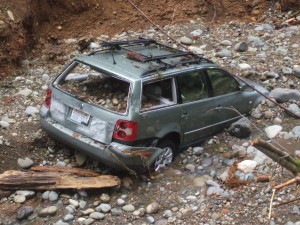More than likely, your first response when experiencing an emergency in your home, is to dial 911. During a disaster, public utilities such as power, phone service or water may be damaged or lost, making 911 unavailable or unreachable. Additionally, access to your home may be restricted, due to downed trees or powerlines, water over the roadway, or a variety of other factors. As a result, it is quite possible that you may not be able to reach 911, should a widespread disaster occur.
What do you do? Are you prepared to provide basic first aid to a family member, neighbor or close friend? Can you survive in your home without electricity, water, telephone or heat? Do you have enough food and water to survive for three (3) days, ten (10) days or even three (3) weeks?
Take a moment and ask yourself, “Could that happen here?” Based on our geography and history, the North Mason area is most likely to experience an earthquake; however, we may also experience other natural disasters such as flooding, heavy snow and high winds. During such disasters, emergency services like fire and police, may be stretched to their limit. Additionally, agencies such as the Red Cross, may not be able to reach the area for days or even weeks.
What Can You Do?
The most common question we are asked is “What can I do in the event of an emergency?” Our answer is simple: Prepare for the emergency. In other words, make sure you and your family are prepared to deal with an emergency before it happens. Because we cannot prevent earthquakes, winter storms or floods, it is important we learn to protect ourselves from the elements by being ready to “Shelter in Place.”
You can prepare your home by keeping an extra supply of food and water, in case you become stranded and cannot drive to a store. Additionally, you should have a disaster kit with an extra supply of medications, bedding, flashlights and tarps. You should also have a survival kit in your car, in case you get stranded and are unable to reach your destination. This kit should also contain a spare supply of medications, blankets, food and water.
For additional information and suggestions for preparing your family for a disaster, you should refer to the Washington State Emergency Management Division.


